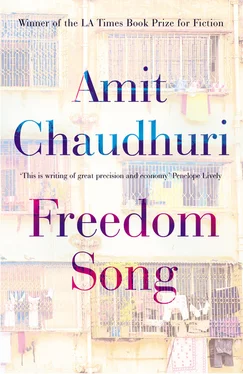‘I might go out myself,’ called Shantidi. ‘I’m waiting for that girl.’ A part-time maidservant came every day at about eleven o’clock to cook meals.
Mini went down the badly lit stairs and emerged then into the bright compound and faced the old building opposite hers, such a faithful mirror-image of her own and yet strangely different; the small first-floor flats with clothes-lines by their windows, the windows covered with a wire gauze, the pipe running down one corner of the wall. It took her about two minutes to get to the main gates and leave the buildings behind her. As she approached the gates she was greeted from behind a gauze net by a woman with a child in her arms on a ground-floor veranda.
‘Minidi, when did you come back?’ Her smile was partly obscured by the gauze, and then she emerged into the open part of the veranda, almost becoming another person, the baby unconcerned in her arms, staring tranquilly at the sky between the tops of the buildings.
‘How is little Bijon?’ asked Mini, her slight smile echoing the woman’s.
She had held so many children in her arms, here, in these buildings, and they had gone. This, these buildings, was home and not home; the country she’d left behind in her youth was home and not home; where you went later was not home either; the baby, though it did not know it, must end up making a journey, must end up somewhere else. Her feelings about home must remain painful and blurred to the end of her life. She took the child in her arms, unprotesting, then gave it back. ‘It seems longer than it has been really. But,’ her voice half-concealed by sounds around her, as if all you could do was become a voice among other voices, ‘I had a rest and lost track of time.’
‘We were wondering,’ said the woman, ‘but I can now see it’s done you good. There’s a shine on your face; I know.’
Pigeons rose suddenly into the sky between the buildings; their conversation evaporated rather than ended; the child began to make sounds as if it had had enough.
And now, with enough time still on her hands, she stepped into the lane.
Hindustani and Bihari tradesmen lived here, on the left of the gates. They did not notice Mini as she walked past. They were like a tribe that clung to its own impenetrable rituals, curiously unconcerned by the public gaze; their forefathers must have moved here a hundred years ago; it seemed they hardly slept; late into the night, sometimes, one could hear the men singing devotionals, and they must be the first humans to be woken by the sunlight at dawn. The lane moved on to the right of the gates of the New Municipal Corporation Buildings and after dissecting, at right angles, the narrow lane that led out to Central Avenue, proceeded towards an old ‘palace’. Between shops there were landlords’ houses, ornate husks, in which no one lived. But no, someone did live in there, for there, across the enclosure of the courtyard, surrounded by the theatre of balconies, doors, and rather beautiful, shadowy stairwells, was the mundane parabola of a clothesline with washing left out to dry. There were little goats in the lane, and, by the side of families, children who were older than babies but not quite teenagers sometimes turned erratic cartwheels, as if they were celebrating something.
As she approached the corner of the small lane, she passed the sweet shop in which business would swell noticeably in the afternoon, before four o’clock, before tea-time, when the daily cargo of sweets and savouries came in. And then their vivid smell would overwhelm the other smells in the immediate proximity of the shop.
Beena had gone to see the play being enacted; Khuku couldn’t go. That evening, it was suddenly done. With the performance of the street-play over, however it might have been tangential or in the background, and the set dismantled, the larger family shattered and became, temporarily, little islands, each with its own memories and pastimes. All that joined them tenuously in their different places were the rumours of something like war. They read the headlines each day, in newspapers that were already old when they’d finished reading them, of a country that had turned upon itself, without really being able to take them in: ‘Where hate comes in a communal garb’; then the smaller headings: ‘Seven killed in violence’; or the same sentence, with eight substituting for seven. Was it really as bad as that? There were these small eruptions and they would hear of them and feel an almost unseemly thrill. There would be a photograph sometimes, of people sitting in a railway station, under a roof like an immense tent with their children and possessions, a child half asleep, looking like the nomads of old, suddenly uprooted, without an address, waiting to depart from the city.
Sleepy-eyed sometimes, sometimes wide awake, they, especially Khuku, would spend the morning reading. They did not know what the appropriate reaction should be: shock; a certain sense of being vindicated; or a lingering sense of unpleasantness. At times Khuku would surprise herself by thinking of Mini and wonder how she was.
Here, a Muslim butcher had been found near the bypass with his skull shattered, blood on his forehead and face. No one knew why he had been killed; there had been a quarrel, a group of people. There was silence while the police looked into it. The man’s face appeared in a photograph, dead, his eyes closed and lips parted, part of his eye and cheekbone obscured by blood.
He seemed to sleep uncomfortably, his lips parted and eyes closed.
But there were always minor surprises. In the personal column, under Death, next to Choudhuri, Mrinalini, was: Passed away peacefully on 19th January, at the age of 77, mourned by two daughters, Priya and Tuktuk, son, Bimal, and daughter-in-law, Soumya, as well as grandchildren Joy and Sharmistha. Ceremony on Tuesday 22nd. All welcome.
Khuku hadn’t noticed this; but Shib saw it. The little obituary, meaningless to almost everyone, a coded message to the few it would nudge towards recognition, signified a pause before the year set off confusedly again in a predetermined direction.
‘Mrinalini Choudhuri — that name sounds familiar,’ said Shib, ordinarily so bad with names.
‘Obviously it’s familiar,’ said Khuku, preoccupied but peremptory. ‘It’s Banidi, that’s who it is, Didi’s friend in college; oh, Banidi, don’t you remember!’ becoming impatient.
Names; one name suggesting another. As the mist began to clear the shock sank in. Mrinalini Choudhuri was Banidi; she had come to their house last year with her younger daughter who was in her forties, saying to Khuku, as if it were a great joke, ‘Khuku! I haven’t seen you in years!’ No doubt a little pleased that she’d outlived her friend, she was still lovely like a long-living creeper that had coiled itself around the earth and thrown up in the evening a new blossom. And she spoke to Khuku, her friend’s younger sister, about ten years younger than her, as if she was a girl: ‘No, no, I won’t hear of it, let’s hear that song, Khuku.’ Inexplicably they’d lost touch for twenty years and thus there was that breathlessness on seeing each other again.
‘It must be Banidi; who else would it be? We used to think she was quite pretty when she was young, you know; dark, but pretty. Why do you ask?’
‘What will it be today, Didi?’ Suleiman asked, as he sat down to tune the tabla. Yet something about his manner always made her impatient.
She decided to sing a love-song she had learnt as a child.
The moon smiles without a hindrance,
Light overflows.
O flower, O tuberose,
Pour forth the nectar of your fragrance.
The nectar of your fragrance — the swooning perfume of an imaginary tuberose! But the song and its words had the innocence of an alphabet, learnt when only sound, and before meaning, had entered the consciousness. She no longer remembered who had taught her this song (the tabla rang, bell-like, as Suleiman struck it with his fingertips); it might have been one of her elder brothers, or a relative, or she might have picked it up from a record. Songs were common currency in the small towns, and in Sylhet they travelled from radios into the interiors of houses and they used to learn them by whatever means possible. Sometimes they would hear a visiting relative singing them in the bath and they had the gift, almost a desperate one, of remembering a tune from these audible snatches. Songs were meant to be stored and collected; people had a large or small ‘stock’ of songs.
Читать дальше












